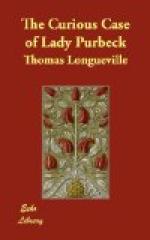It may be observed here that some years later, in fact in the year 1640, Sir Robert Howard turned the tables upon Laud for this transaction. “On Munday, December 21,” wrote Laud in 1640, “upon a Petition of Sir Robert Howard, I was condemned to pay Five Hundred Pounds unto him for false Imprisonment. And the Lords Order was so strict, that I was commanded to pay him the Money presently, or give Security to pay it in a very short time. I payed it, to satisfie the Command of the House: but was not therein so well advised as I might have been, being Committed for Treason.” Laud was at that time a prisoner in the Tower, only to leave it for execution. In addition to this L500, Sir Robert was ordered to have a fine of L250 paid to him by the sorcerer, Lambe, and another fine of L500 by a man named Martin;[90] so altogether, the Long Parliament assigned him,L1,250 damages.
In a letter to the Lord Deputy, dated 24th June, 1635,[91] Garrard says: “Sir Robert Howard, after one month’s close imprisonment in the Fleet, obtained his liberty, giving L2,000 bond never more to come at Lady Purbeck, wherein he stands bound alone; but for his appearance within 30 days, if he be called, two of his brothers stand bound for him in L1,500, so I hope there is an end of the business.”
On the 30th of July, 1635, the same correspondent wrote of Lady Purbeck’s being “in some part of France, where I wish she may stay, but it seems not good so to the higher powers: for there is of late an express messenger sent to seek her with the Privy Seal of his Majesty to summon her into England, within six weeks after the receipt thereof, which if she do not obey, she is to be proceeded against according to the laws of this Kingdom.”
In a letter[92] from the “Rev. Mr. Thomas Garrard to the Lord Deputy,” dated 27th April, 1637, there is an announcement which may surprise some readers:—
“Another of my familiar acquaintance has gone over to that Popish religion, Sir Robert Howard, which I am very sorry for. My Lady Purbeck left her country and religion both together, and since he will not leave thinking of her, but live in that detestable sin, let him go to that Church for absolution, for comfort he can find none in ours.”
Now, “the Reverend Mr. Garrard” can scarcely have known what Sir Robert would, or would not, “leave thinking of,” and, as to his living “in that detestable sin,” he and his fellow-sinner had not been even in the same country for nearly two years at the time when Garrard was writing; and, as we have already shown, the unlikelihood of their having committed the sin in question for another couple of years before that may be more than plausibly argued. And it should be remembered that these two people could have no object in becoming Catholics, unless they received the benefits of the Sacraments of the Catholic Church; and as Catholics, they would believe that their confessions would be sacrileges, their absolutions invalid, and their communions the “eating and drinking their own damnation,” unless they confessed their immoralities among their other sins, with a firm purpose never to commit them again.




